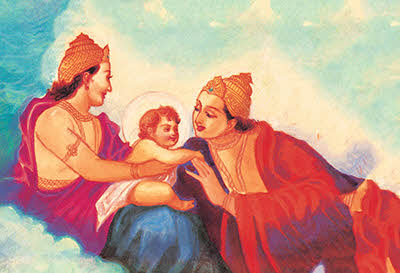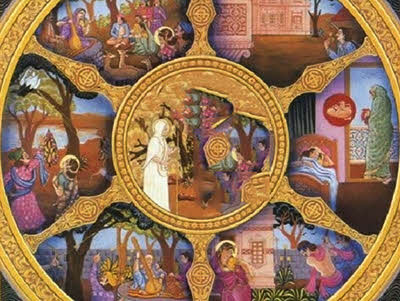
Then he was born as the son of King Suvarnajangha and Queen Laksmi in Jambudvipa,, in the East Videhas, near the Ocean on the north bank of the big river Sita, in the province Puskalavati, in the city Lohargala. Then with delight blossoming forth, on an auspicious day the happy parents gave him the name of Vajrajangha. In a short time Svayamprabha, afflicted by grief, devoted to works of Dharma, also fell like Lalitanga. In this same province in the city Pundarikini, she became the daughter of the Cakrin Vajrasena and his wife Gunavati. She was endowed with beauty surpassing all the world, and was named Srimati by her parents. Cared for by nurses like a creeper by women-gardeners, she grew up gradually, her body delicate and her hands like shining blossoms. As a jewel adorns a gold ring, youth adorned her making the sky blossom, as it were, with her glossy beauty.
One day, for amusement she ascended the high palace named Sarvatobhadra, like a streak of twilight-clouds on a mountain. Then in a beautiful garden she saw the gods coming to Muni Susthita who had reached omniscience. “Where have I seen this before?” Using uha and apoha she recalled her former births like a dream of the night. At once she fell on the ground in a swoon as if unable to bear in her heart the load of the knowledge of her former births. After she had recovered consciousness from treatment of sandal, etc., administered by her friends, she got up and reflected as follows: “Lalitanga, my husband in a former birth, fell from heaven. Where has he descended now? Ignorance of this grieves me. Since he fills my heart, there is no other lord of my heart. Who indeed would put salt in a dish of camphor? He is the lord of my life. If there is no opportunity of conversation with him, what use is there in talking to anyone else?” and she took a vow of silence. Fearing that it was a derangement due to supernatural agency, her friends gave treatment of charms, spells, etc., such as was fitting. She did not abandon her silence even from one hundred remedies. For certainly one disease is not cured by the remedy for another. On occasion she gave instruction to her retinue by writing and by gestures with her eye-brows, hands, etc.
One day Srimati had gone to a pleasure-garden, and her nurse, named Pandita, seized a favorable opportunity and spoke to her privately: “You are like my life to me; I am like your mother. There is no reason for lack of confidence between us. Tell me, daughter, why you have taken to silence. Make your grief easier by sharing it with me. When I know your grief, I shall proceed to the business of curing it. For a treatment of unknown disease is not right.” She then told Pandita an exact account of her former life, like a man making confession to a good guru. Having represented Srimati’s story on canvas by pictures, Pandita, learned in strategy, went quickly to display it outside. It was the birthday of the Cakrin Vajrasena and for this occasion many kings came there. After she had painted the canvas clearly, Pandita spread it out on the highway, and stood like the strong desire of Srimati. Some who knew the scriptures praised the painted heaven, Nandisvara, etc., in it which agreed with the description in the scriptures. Other laymen, nodding their heads, described the images of the holy Arhats one by one. Looking repeatedly with side-long glances, some, who had experience in the arts, praised constantly the purity of line. Others described the colors, black, white, yellow, blue, red, etc., that made the canvas look like a twilight-cloud.

Just then King Durdarsana’s son, who was fittingly named Durdanta, came there. He looked at the canvas with circumspection for a moment, fell on the ground in a pretended faint, and got up like one who has regained consciousness. Questioned by the people as to the reason for his fainting, after he had got up, he told a story giving a false account. “Someone has painted on the canvas the incidents of my former birth, and at the sight of it here the recollection of the birth took place. I am the god Lalitanga, and Svayamprabha was my goddess. All this agrees exactly with what is painted here on the canvas.” Then Pandita asked him, “If that is so, sir, then tell what this composition on the canvas is. Explain it with your finger.” He said, “This is Mt. Meru. This is the city Pundarikini.” Again asked about the name of the muni, he said he had forgotten the name. Again asked “Who is this king, surrounded by ministers? this woman ascetic?” he replied, “I do not know their names.”
Recognized as a deceitful person, he was addressed by her with ridicule: “O son, this account of your former birth agrees exactly with this. You are Lalitanga, sir, and Svayamprabha is your wife. Now as a result of karma she is a lame girl in Nandigrama. From recollection of her former birth, she painted her own life and gave me the canvas when I went to Dhatakikhanda. I have searched for you out of compassion for her, lame as she is. So, come to Dhatakikhanda. I shall lead you to her presence. Pitiable in separation from you, she lives in grief. Console at once your wife dearer than life in a former, birth, O son.” When Pandita became silent after speaking thus, the deceitful man was ridiculed by his own friends. “Oh, there is fruition of your merit from this acquisition of a jewel of a woman.” “By all means this lame girl must be approached and supported.” Then Prince Durdanta, his face pale from embarrassment, (looking) like a piece of goods that has been left after a sale, went elsewhere.











No comments yet.
Leave a comment